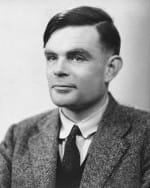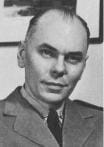Category: People
John Eckert
J Presper Eckert Jr. attended the William Penn Carter School in Germanstown. In 1937, after graduating from school, he entered the Moore School of Electrical Engineering at the University of Pennsylvania from where he graduated in 1941. After graduation he was offered a teaching job at Moore, where he met…
John Von Neumann
Von Neumann’s interest in computers differed from that of his peers by his quickly perceiving the application of computers to applied mathematics for specific problems, rather than their mere application to the development of tables. During the war, von Neumann’s expertise in hydrodynamics, ballistics, meteorology, game theory, and statistics, was…
Grace Hopper
Howard Aiken
John Atanasoff

John Atanasoff, a professor of mathematics and physics at Iowa State College, built an electronic binary computer that represents the first applications of electronics to automatic calculation. Despite never being fully operational, his ideas were major contributions to modern electronic computers. He was long familiar with the problems of solving…
Konrad Zuse

Born June 22, 1910, Berlin-Wilmersdorf, German scientist Konrad Zuse built the first of two electromechanical computers, the Z1 and Z2. A civil engineering student in 1934, he quickly saw the potential value of a machine that solved tedious algebra in minutes. He built them using binary, setting the use of…
Alan Turing

Born June 23rd, 1912 in London, England, Turing displayed a penchant for math at an early age. He attended Kings College, Cambridge, and Princeton, where he earned a Ph.D. in mathematics. He published “On Computable Numbers” in 1936, which established the theoretical foundations of digital, stored-program computing. During WWII he…
John Eckert
J Presper Eckert Jr. attended the William Penn Carter School in Germanstown. In 1937, after graduating from school, he entered the Moore School of Electrical Engineering at the University of Pennsylvania from where he graduated in 1941. After graduation he was offered a teaching job at Moore, where he met…
John Von Neumann
Von Neumann’s interest in computers differed from that of his peers by his quickly perceiving the application of computers to applied mathematics for specific problems, rather than their mere application to the development of tables. During the war, von Neumann’s expertise in hydrodynamics, ballistics, meteorology, game theory, and statistics, was…
Grace Hopper
Howard Aiken
John Atanasoff

John Atanasoff, a professor of mathematics and physics at Iowa State College, built an electronic binary computer that represents the first applications of electronics to automatic calculation. Despite never being fully operational, his ideas were major contributions to modern electronic computers. He was long familiar with the problems of solving…
Konrad Zuse

Born June 22, 1910, Berlin-Wilmersdorf, German scientist Konrad Zuse built the first of two electromechanical computers, the Z1 and Z2. A civil engineering student in 1934, he quickly saw the potential value of a machine that solved tedious algebra in minutes. He built them using binary, setting the use of…
Alan Turing

Born June 23rd, 1912 in London, England, Turing displayed a penchant for math at an early age. He attended Kings College, Cambridge, and Princeton, where he earned a Ph.D. in mathematics. He published “On Computable Numbers” in 1936, which established the theoretical foundations of digital, stored-program computing. During WWII he…


